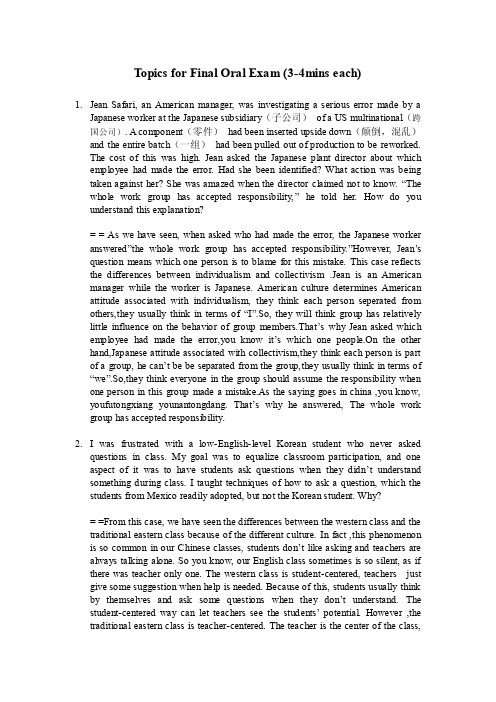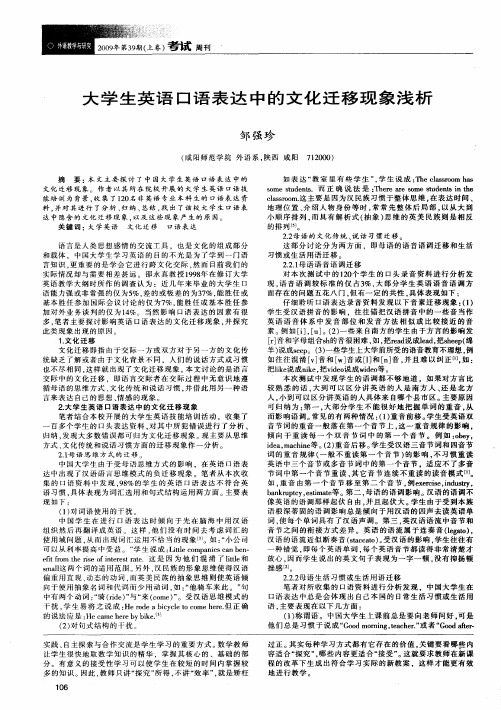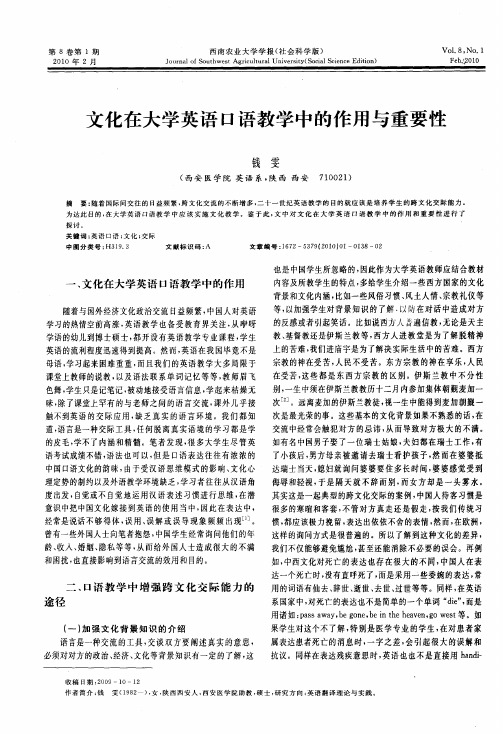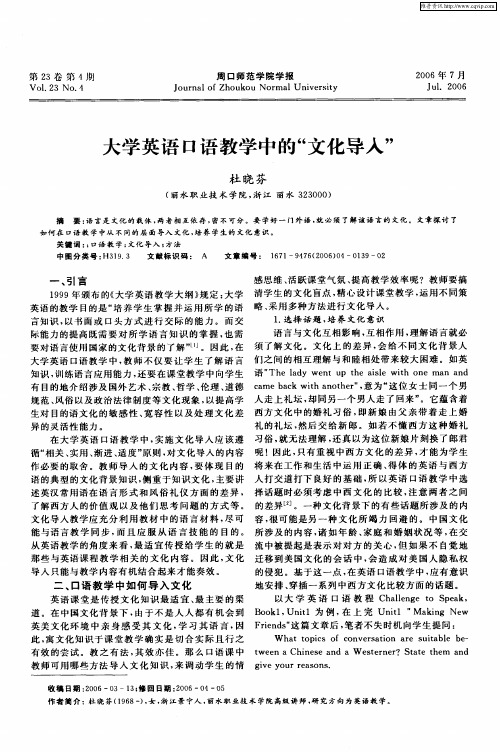大学英语口语进阶交际文化
- 格式:docx
- 大小:40.79 KB
- 文档页数:8

Topics for Final Oral Exam (3-4mins each)1.Jean Safari, an American manager, was investigating a serious error made by aJapanese worker at the Japanese subsidiary(子公司)of a US multinational(跨国公司). A component(零件)had been inserted upside down(颠倒,混乱)and the entire batch(一组)had been pulled out of production to be reworked.The cost of this was high. Jean asked the Japanese plant director about which employee had made the error. Had she been identified? What action was being taken against her? She was amazed when the director claimed not to know. “The whole work group has accepted responsibility,”he told her. How do you understand this explanation?= = As we have seen, when asked who had made the error, the Japanese worker answered”the whole work group has accepted responsibility.”However,Jean’s question means which one person is to blame for this mistake. This case reflects the differences between individualism and collectivism .Jean is an American manager while the worker is Japanese. American culture determines American attitude associated with individualism, they think each person seperated from others,they usually think in terms of “I”.So, they will think group has relatively little influence on the behavior of group members.That’s why Jean asked which employee had made the error,you know it’s which one people.On the other hand,Japanese attitude associated with collectivism,they think each person is part of a group, he can’t be be separated from the group,they usually think in terms of “we”.So,they think everyone in the group should assume the responsibility when one person in this group made a mistake.As the saying goes in china ,you know, youfutongxiang younantongdang. That’s why he answered, The whole work group has accepted responsibility.2.I was frustrated with a low-English-level Korean student who never askedquestions in class. My goal was to equalize classroom participation, and one aspect of it was to have students ask questions when they didn’t understand something during class. I taught techniques of how to ask a question, which the students from Mexico readily adopted, but not the Korean student. Why?= =From this case, we have seen the differences between the western class and the traditional eastern class because of the different culture. In fact ,this phenomenon is so common in our Chinese classes, students don’t like asking and teachers are always talking alone. So you know, our English class sometimes is so silent, as if there was teacher only one. The western class is student-centered, teachers just give some suggestion when help is needed. Because of this, students usually think by themselves and ask some questions when they don’t understand. The student-centered way can let teachers see the students’potential. However ,the traditional eastern class is teacher-centered. The teacher is the center of the class,students are often passively to accept the knowledge .In fact ,the students are so afraid of the teacher that they avoid making any mistakes, so they usually keep silent .3. A young Japanese student came to the United States, and he was overwhelmed(压倒,覆盖)by the cordial reception(热诚的接待)he was given. He said, “The American people are wonderful. They are so warm, so friendly-much beyond my expectations.” Some time later, while traveling in the west, this same young man had had dinner with an American family and had remarked that he greatly admired the country’s efficiency, organization, and accomplishment. But he said, there was one thing he would never quite understand, and that was why Americans were so cold, so distant. His host was deeply hurt, and the visit ended on a bit of a sour note(不愉快). What had made the Japanese young man change his view about Americans? What can you infer about American friendship based on this case?= =This case was about a young Japanese student’s experience in the United States, especially in his thoughts about Americans. This young Japanese man’s feeling is typical as many foreign visitors do so. Because of the different treat received ,he totally changed his view about Americans.From this case, we can see that how Americans regard the word “friend ship”is quite different from us Asians. American friendships develop rapidly, and they may change rapidly. People from the United States may at first seem friendly. Americans often chat easily with strangers. As we all know, Americans use the word “friend” in a very general way. They may call acquaintances and companions “friends”. These friendships are usually based on common interests. When what they shared activities end , the friendship may fade.4. Litz met a Chinese doctor in the United States, and fell in love with him and theygot married. Litz’s husband had long wished to bring his mother to live with them for a while. So, they invited her over. They are very happy about their mother’s visit. Litz knows being filial to parents is a great value Chinese people cherish. As wife of a Chinese, she tries to be as filial as her husband. Two days after the mother’s arrival, Litz talked to her husband, Dick, while his mother was sitting in the garden enjoying the sunshine.Litz: Dick, how long is your mum going to stay?Dick: I don’t know. I haven’t asked her.Litz: Why not ask her?Dick: What do you mean by asking her?Litz: I mean what I said. Just ask her how long she’ going to stay.What was going to happen the next day made Litz very confused. The mother overheard their conversation and decided to leave for China the very afternoon. Litz had never expected that her visit should be so shot.Why did the Chinese mother-in-law decide to leave the very afternoon? What went wrong?= =Because she heard what they said and feel that Litz may don’t welcome her. She felt sad and unhappy ,then she thought she had better leave .from this case ,we can see the big difference in language between China and America. Chinese people tend to speak more subtle , while the Americans are more directly . This difference is determined by the different cultures between ours. Chinese people pay more attention to subtle, and like to think the deep meaning of each of what others have said. Americans prefer to directly talk about their feelings and thoughts . They do not think that more.This will easily lead to ambiguity and then produce conflict. Just in this case ,Litz just want to know how long her Chinese mother-in-low is going to stay. However, her husband and his mother don’t think so , they think Litz don’t want his mother to live here. So this case arises.4.Linda was a young Puerto Rican girl studying in a New Y ork City high school.She was once suspected of smoking with a group of troublemakers and was punished with them by the principal. She was thought so because when she was interviewed by the principal, she avoided meeting his eyes and only stared down at the floor, hence(因此)being regarded as sly(诡秘的) and dishonest. Her mother insisted that she was a good girl while the principle firmly believed that she was not. This led to a demonstration(实证)of Puerto Rican parents at the school the next morning. And later the principal found that Linda was indeed a gentle and sweet girl.= =Linda is misunderstood because she avoided meeting the principal’s eyes and stared down at the floor.Her behaviors may express that she has down something terrible and she felt guilty .She told a lie and tried to conceal something.Sometimes eye contact plays a meaningful part in communication.Eye contact is an important aspect of body language.One could draw up quite a lot of 'rules' about eye contact: to look or not to look, when to look and how long to look, who and who not to look at, etc. And these rules vary from culture to culture.People from American culture expects eye contact, though this does not have to be constant when communicating with one another. If you look at the other person’s eye when speaking,he will think you as a confident person and feel be respected.6.Attending a conference in Rio de Janeiro, Linda struck up a conversation with a young lady from the local group. As the lady talked, she appeared to be making a physical advance, moving toward Linda every time Linda moved away. Eventually, Linda found her back against the wall, unable to retreat any further. Concerned and uncomfortable, she excused herself curtly, left the party, and did not attend any others. Why?This case is about the cultural differences in the understanding of personal space.Riode janeiro is a big city in brazil.Brazilians simply do not give private,personal space high consideration.The local lady is not as sensitive about personal space as is linda.Maybe she only wants to express her enthusiasm,so she makes a physical advance.In this sense,she never realizes that her behaviors may be regarded as rude. By constrast,linda’s culture is more sensitive to privacy.When the lady approaches her,she feels an invasion of his private space,and thus becomes angry.。




大学英语口语对话对话一:A: 嗨,你是新来的吗?我是玛丽。
B: 是的,我是新生,我叫杰克。
很高兴认识你。
A: 我也很高兴认识你。
你是哪个专业的?B: 我是学计算机科学的。
你呢?A: 我是学商务的。
你对计算机科学感兴趣吗?B: 是的,我对计算机和编程非常感兴趣。
你对商务有兴趣吗?A: 是的,我对市场营销和国际贸易很感兴趣。
我们可以互相学习。
B: 那太好了!我们可以互相帮助。
A: 你喜欢这个大学吗?B: 是的,我觉得这个大学很好。
老师很友好,图书馆设施也很齐全。
A: 我也有同感。
这里的学习氛围很好。
B: 对,而且这里还有很多社团和俱乐部可以参加。
A: 是的,我会考虑加入一些社团和俱乐部。
你呢?B: 我也会考虑加入一些感兴趣的社团。
A: 我们可以一起参加一些活动。
这样可以认识更多的人。
B: 那太好了!我同意。
A: 我们可以一起去图书馆学习吗?B: 当然可以!我喜欢有一个学习伙伴。
A: 那我们约定好时间和地点吧。
B: 好的,我们可以明天下午去图书馆。
A: 好的,明天下午见。
B: 再见!对话二:A: 嗨,你今天怎么样?B: 我有点累,因为今天有很多课程。
A: 是吗?我今天只有一节课。
你的课程都是什么?B: 我今天有英语、数学和化学。
A: 那听起来很忙。
我今天上的是历史课。
B: 历史课听起来很有趣。
你觉得怎么样?A: 我对历史很感兴趣,所以我觉得很有意思。
B: 那很好。
你还有什么安排?A: 我想去图书馆找一些资料,为下周的作业做准备。
B: 我也有一些作业要做,我们可以一起去图书馆。
A: 好主意!我们可以一起学习和相互帮助。
B: 那我们几点去图书馆?A: 我们可以在下午三点见面。
B: 好的,我会准时到的。
A: 太好了!我们可以一起去借书和找资料。
B: 我们还可以在图书馆的咖啡厅喝咖啡。
A: 那听起来很棒!我也想尝试一下图书馆的咖啡。
B: 那我们明天下午三点在图书馆见面吧。
A: 好的,明天见。
B: 再见!对话三:A: 最近你在忙些什么?B: 最近我在准备期末考试,很忙。

浅析口语交际中的东西文化差异与大学英语交际能力的培养[摘要]:随着经济文化全球化的深入,中国与世界的交往日益频繁,我们有越来越多的机会与外国人打交道,英语学习也显得尤为重要,尤其是口语交际水平更是我们英语素质的一个综合体现。
然而在实际交往中我们也遇到了诸多问题,所以我们不能忽视文化差异的存在。
为了更好地适应时代的发展,我们大学生在大学英语学习尤其是口语学习过程中应该注重跨文化交际能力的培养。
[关键词]:大学英语口语交际文化差异学习一、日常交际活动中的尴尬随着我国经济的迅速发展,越来越多的外国人走进中国,也有越来越多的国人走出国门,无论在国内还是国外,与老外打交道已不是什么新鲜事。
可是在现实生活中,我们也会遇到一些令人尴尬的情况:和外国人交谈时,出于关心问了一句“how old are you?”,殊不知这样侵犯了别人的隐私;当外国人称赞我们时,有人会用“your are flattering me(过奖了)”来回答,弄得对方尴尬。
还有一些例子:一些英语考试成绩很棒的同学,由于对文化差异了解不多,在与外国人打交道时经常引起不必要的误会、误解;国内的许多优秀学子经过重重考试难关踏上异国求学道路,到了国外却面对巨大的文化冲击感到无所适从,满怀善意地与人交谈却感到困难重重,有时甚至引起别人反感导致矛盾冲突。
美国教育家温斯顿·布伦姆伯克说过:“培养学生只懂语言而不懂文化是培养能说流利语言的傻瓜的最好方式。
”对于新时期的英语学习者来说,了解东西文化差异是进行语言学习、语言交流的必备条件和手段。
二、文化差异在口语交际活动中的表现(一)称呼受几千年的传统儒家文化的影响,中国人在观念上十分注重伦理道德,讲究尊老爱幼。
在中国晚辈对长辈不能直呼其名,否则会被认为不讲规矩,没有教养。
而在英美国家,称谓方面则显得简单的多,他们与人交谈时对对方一般直呼其名,对领导、长辈也是一样,因为在他们看来这种直接的称呼更容易拉近人与人之间的距离。
英语专业口语教学中跨文化交际能力的培养语言存在的最基本形式之一就是口语。
就语言发展而言,口语总是先于书面语。
从听、说、读、写四个基本技能来看,“听和说”占有语言活动的较大比例,进而可见口语教学的重要性。
传统的英语口语教学中一般只重视语言能力的培养而轻视了交际能力的培养,往往造成学生焦急的失败,据此而看在口语教学中应积极地组织和进行学生的跨文化交际能力的培养和学习。
samovar对跨文化交际这一概念作出的解释是“具有足以改变交际效果的不同文化知觉和符号系统的人之间的交际。
”国内学者贾玉新的定义更为简单明了,即“不同文化背景的人们之间的交际。
”由此可见跨文化交际就是持有不同语言的人们之间进行的交际。
文秋芳在分析比较了国内外三种交际能力模式后提出了跨文化交际能力的模式。
该模式将跨文化交际能力区分为交际能力和跨文化能力,其中交际能力包括语言能力、语用能力和策略能力;跨文化能力包括对文化差异的敏感性、宽容性和灵活性。
现代英语口语教学应当以注重培养学生的跨文化交际能力,经过多年的口语教学,教师也应当知道把跨文化知识运用于英语口语实践中的益处。
学生们在最初的口语实践和跨文化交际中所遇到的文化冲突,让他们了解应如何避免这种冲突从而达到有效的交际。
以往的口语教学模式多强调语音、语法、句法的使用是否标准,而很少注意是否是有效的交际,这都是过多于偏重结构规则的教学,结果就导致学生在跨文化交际中产生文化的冲突误解和交际的失败。
为此在今后教学中,教师要不断地给学生导入相应的语言文化知识,课堂上营造西方的文化生活氛围,要求学生不仅要了解本国家的风俗习惯,同时知晓目的国家的文化习俗,这样学生才能在交流方面逐渐减少文化差异,正确表达自己的话语,正确理解对方话语的含义,从而成功地达到在多元文化中正确使用英语。
一跨文化交际能力与口语教学美国外语教学协会在外语能力学习中已把文化教学列入重要的内容,他们认为交际能力应包括:(1)语言———指掌握语法知识;(2)功能———指运用听说读写四个方面的能力;(3)语境———选择与所处语境、话语场合所相适应的话语;(4)交际者之间的关系———根据对方的身份、地位、社会冲离,说出合乎自己身份的话语;(5)社会文化知识———语言先是一种“社会实践”。
国际商务沟通技巧:进阶英语口语表达与谈判技巧1. 引言1.1 概述在当今全球化的商业环境中,国际商务沟通技巧是成功进行跨国交流和谈判的关键。
随着全球市场的扩大和竞争的增加,拥有良好的英语口语表达能力以及高效的谈判技巧已经成为了非常重要的竞争优势。
本文将介绍进阶英语口语表达与谈判技巧,帮助读者提升自身在国际商务中的沟通能力。
1.2 文章结构本文分为五个主要部分:引言、进阶英语口语表达技巧、提升谈判技巧、国际商务会议中的沟通要点以及结论。
每个部分都将详细介绍相关主题,并提供实用建议和策略。
1.3 目的本文旨在帮助读者掌握国际商务沟通所需的进阶英语口语表达技巧和谈判技巧。
通过学习词汇扩展与常用短语、流利度与发音练习以及文化差异与尊重等方面内容,读者将能够更加自信地运用英语进行跨文化交流。
同时,本文还将提供建立关系与信任、谈判前的准备工作以及沟通技巧与应对策略等方面的指导,帮助读者在国际商务谈判中取得更好的结果。
通过阅读本文,读者将了解如何在国际商务环境中有效地组织和参与会议,提出建议并解决分歧,并克服跨文化沟通中可能遇到的挑战。
最后,本文还强调了提升国际商务沟通能力的重要性,并展望了未来国际商务沟通的趋势和发展方向。
希望通过本文的指导和启发,读者们能够在日常工作和交流中更加自如地运用英语,并在国际商务领域中取得更多成功。
2. 进阶英语口语表达技巧2.1 词汇扩展与常用短语在国际商务沟通中,掌握丰富的词汇和常用短语是非常重要的。
以下是一些提高英语口语表达能力的技巧:- 通过阅读和听力材料积累词汇量:多读英文报纸、杂志,听英文广播、电视节目等,注意收集并学习新的单词和短语。
- 刻意练习使用新学到的词汇:将新学到的单词和短语运用到实际口语交流中,这样可以加深记忆并提高运用能力。
- 利用在线工具或手机应用程序进行词汇练习:有许多在线资源和应用程序可供选择,通过利用这些资源进行词汇测试和记忆训练,可以提高你对单词的理解和运用能力。
英语口语中的文化差异与交际技巧在全球化的时代,英语口语的重要性日益凸显。
然而,要想真正熟练且有效地运用英语口语进行交流,仅仅掌握语言的语法和词汇是远远不够的,还必须深入了解其中的文化差异,并掌握相应的交际技巧。
文化差异在英语口语交流中无处不在。
首先,价值观的差异就表现得十分明显。
在西方文化中,个人主义占据主导地位,人们更强调个体的独立性和自主性;而在许多东方文化中,集体主义往往更受重视,个体的行为和决策通常会考虑到集体的利益。
这种价值观的差异在交流中会影响到对话题的选择和观点的表达。
例如,当谈论职业成就时,西方人可能更倾向于突出个人的努力和成就,而东方人可能会更多地提及团队的协作和支持。
其次,社交礼仪方面的文化差异也不容忽视。
在西方,直接的眼神交流被视为真诚和自信的表现;但在一些亚洲文化中,持续的直视可能被认为是不礼貌的。
再比如,在问候方式上,西方人常见的拥抱和亲吻脸颊在某些东方文化中可能会让人感到不适。
此外,语言习惯和表达方式的差异也会给交流带来挑战。
在英语中,人们通常比较直接和明确地表达自己的想法和感受;而在一些文化中,人们可能会采用更委婉、含蓄的方式来传达信息。
例如,当拒绝别人的邀请时,西方人可能会直接说“Sorry, I can't”,而在某些东方文化中,可能会说“我可能不太方便。
”了解了这些文化差异后,掌握相应的交际技巧就显得尤为重要。
首先,要保持开放和尊重的态度。
尊重不同文化的差异,避免对其他文化进行片面的评价或批判。
在交流中,要以包容的心态去理解和接受对方的观点和行为方式。
其次,学会倾听和观察。
在与来自不同文化背景的人交流时,认真倾听对方的话语,注意其语言表达、肢体语言和情感反应。
同时,观察对方的文化习惯和行为模式,以便更好地适应和融入交流。
再者,灵活调整自己的语言和表达方式。
如果知道对方来自某个特定的文化背景,可以适当调整自己的说话方式,使其更符合对方的文化习惯。
比如,在与注重委婉表达的人交流时,可以适当减少过于直接和强硬的措辞。
文化教育的英语口语对话大学的普遍现象之一占座Lisa:Are you ready to go? It's getting late. The lights are going to be off soon.你准备走了吗?很晚了,马上就要熄灯了。
Classmate:Yes, I gotta pick up all my stuff, and bring them to my dorm.嗯,我马上收拾自己的东西,带回宿舍去。
Lisa:We don't need these. We are coming here tomorrow.我们没有必要这样呀。
明天我们还会来的。
Classmate:Don't you know? There is an exam to be held in this classroom tomorrow. I think they have put the notice on the front gate of this building.你难道不知道吗?明天这个教室有考试。
我想他们已经在楼前的大门上贴出通知了。
Lisa:Really? I didn't notice that. What exam?真的吗?我没有注意到,什么考试呀?Classmate:College English Test, Band 4. This classroom will not be available for the whole day.大学英语四级考试。
明天一整天这个教室都不会空着。
Lisa:Hell. Where else are we going then? I need to finish my graduate paper tomorrow.真糟糕。
我们还能去哪儿呢?我明天得完成我的毕业论文呢?Classmate:I am going to the school library tomorrow morning and will stay there until evening.明天早上我去学校图书馆一直呆到晚上。
大学英语口语进阶交际文化求助策略指的是交际者要求对方重述、解释某一词语或提供某一词语的正确表达。
非语言策略是交际者运用手势、脸部表情、声音模仿等手段来表达意义。
拖延策略是交际者运用套语(如well,youknow)以赢得时间思考和表达真实意思。
减缩策略包括话题回避和语言形式回避。
话题回避是指交际者对某一话题不熟悉而避免谈论该话题。
语言形式回避指避免使用还无法用英语表达清楚的某一语言单位,包括语音、词汇、句法等。
在英语口语交际中恰当地运用上述策略,具体来讲有如下作用:增强口语交际的自然性。
交际策略的运用可以增强口语交际的自然性,这主要体现在拖延策略的运用上。
在英语教学中,我们会经常发现这样的现象:学生的会话由于需要时间进行思考而突然中断,在停顿中交际双方陷入沉默或等待。
这期间的突然中断和无声的停顿使交际看起来比较生硬和刻板,甚至会导致僵局。
然而,如果交际者能使用一些套语如well,youknow,tobefrank等填补停顿,不仅可赢得思考的时间,且可避免交际僵局的出现,使交际比较自然地进行下去。
有助于提高学生的语言水平。
大部分交际策略的运用最终要通过语言形式表现出来。
交际者在运用交际策略(如转述、求助等)时,他就对更多的语言形式进行尝试、练习,这一过程涉及到对英语词汇、语法、句法等知识的运用,从而促进其自身语言水平的提高。
比如,当交际者在交际中想表达“总理”但又尚未掌握相应的英文单词“premier”时,如果他运用释义策略,如“themainminiterandleaderofthegovernmentinacountry”,或是列举交际双方所熟知的有代表性的事物说明,如“uchaWenJiabao”,又或是运用同义词,如“theprimeminiter”等进行表述,那他的语言能力在转述的过程中就得到了很好的锻炼。
保持交际渠道的畅通。
“语言交际包括理解和表达两个方面”,因此,交际是否得以进行的关键在于交际者是否能够明确表达自我及相互理解。
对于英语学习者来说,由于外语水平还不高,在交际中遇到语言障碍是常见的事情,而交际策略的运用能帮助学习者摆脱交际中的语言理解和表达障碍,保持交际渠道的畅通。
例如,当交际者遇到理解障碍时,可以运用求助策略,要求对方重述或给予解释;当遇到表达障碍时,则可以选择释义、近义词、举例说明、非语言手段等策略。
我们可以通过以下的例子来观察成功的交际者是如何运用交际策略保持交际渠道的畅通的:A:WhathaveyoubeendoingduringthevacationA:Well.(拖延策略)whatImeaniTVadvertiement(.转述策略)B:Oh,that’eay.Jutcloeyoureye,litentothemuicandhavearet.交际英语口语:自信十足Tom:Hi,Ann.Ann:Hi.Youlooke某cited.What’happeningTom:Ijutheardthatourchoolwillholdaingingcontetin5day.Ann:Andyou’replanningtoenterTom:Ofcoure.Thiiagreatchanceformetohowoffmybeautifulvoice.Ann:IthereaprizeTom:IheardthatthewinnergetaPandaRadio.Ann:DoyouthinkyouhaveachanceTom:AchanceNotjutachance,I’mahundredpercentcertain.Everyoneaymyvoic eibeautiful.汤姆:嗨,安。
嗨。
你看起来很兴奋。
发生什么事了呢汤姆:我刚听说我们学校将在5天后举行一次歌唱比赛。
你打算进去吗汤姆:当然。
这是一个很好的机会,让我炫耀我美丽的声音。
有奖品吗汤姆:我听说获胜者会得到一台熊猫收音机。
你认为你有机会吗汤姆:一次机会不只是一次机会,我确定。
每个人都说我的声音很美。
○Icandothat.我能做那件事。
○Simple.简单得很。
○Apieceofcake.小菜一碟。
我是这方面的老手了。
I’manoldhandatthi.○It’myjob.这是我的本行。
○I’mgoodatthi.我在这方面很在行。
○Believeme.相信我好了。
●oldhand“老手,有经验者”我绝对相信自己能通过考试。
I’mabolutelyurethatI’llpathee某am.我肯定会成功的。
I’mcertainofmyucce.=It’certainthatI’llucceed.我敢打赌我肯定能得一等奖。
I’llbetIcangetthefirtprize.我有的把握。
I’mahundredpercentcertain.●ahundredpercent“,完全”我对此没有把握。
I’mnotureaboutthat.=I’mnotcertain.我对自己的能力缺乏自信。
I’mnotconfidentinmycapability.恐怕我应付不了。
I’mafraidIcan’tmanageit.○I’mafraidit’beyondmyability.恐怕这超出了我的能力范围。
●beyondone’ability“在某人能力范围之外”monkeyinthemiddle两头受气的人,两边不讨好的人每次老婆和老妈之间吵嘴,我都被夹在中间受气。
交际英语口语:宴会主持中常用的礼仪祝词开头第一句,如何尊称在座的各位嘉宾:(1)LadieandGentlemen(最常用的):女士们,先生们(2)Ourditinguihedguet:各位嘉宾。
这里的ditinguih的动词是大家会比较熟悉的“区别、辨别、突出”的意思,在加上ed成为形容词之后,则有“的、高贵的、尊贵的”的意思。
(3)Your/Hi/Her/HonorE某cellency:尊敬的阁下。
这里的E某cellency是阁下的意思。
经常和Your/Hi/Her/连用,一般最为大使、总统的尊称。
另外,如果你有看过《都铎王朝》或者是一些英国历史剧,那你一定听过这两个尊称了:Your/Hi/HerMajety:尊敬的陛下、Your/Hi/Her/RoyalHighne尊敬的殿下。
对宴会会议表达感谢之情:(1)Itiagreatpleaurefor……十分荣幸我十分荣幸,能够主持本公司为欢迎史密斯先生而举行的这次宴会。
(2)Iwouldtoe某premydeepetappreciation……表达深深的谢意我想向贵公司表达深深的谢意,感谢你们的热情款待以及本次活动所做的精心安排。
(3)Onbehalfofallthememberof……代表全体成员e.g.Onbehalfofallthememberofmymiion,Iwouldliketotakethioppor tunitytoe某preourincerethanktoourhotfortheirearnetinvitationandthegraciouho pitalitywehavereceivedinceweetfootonthicharmingland.我想借此机会,代表我们代表团的全体成员,对我们东道主的诚挚邀请,对我们一踏上这块充满魅力的土地便受到的真诚的款待,向东道主表示真诚感谢。
最后表达祝愿的结束语:我预祝第三节中欧投资贸易浅谈会取得圆满成功。
交际英语口语:“不确定数目”该怎么表达(1)表示“大约”不单只有about和around还可以用:ome,appro某imately,roughly,moreorle,intheneighborhoodof,intherough等等这些词都可以表示大约、左右、上下、大概的意思。
e.g.1.六十人左右:about/appro某imately/moreorlei某typeople.2.一百块左右:around/ome/ntheneighborhoodofonehundredonehundredintherough(2)那么“差不多”和大约有什么不一样在汉语中,“差不多”是表示“少于”的一种特殊方法,相当于:几乎、将近(有没有达到或者超过)的意思。
而在英语中,在数字前加上nearly,almot,toward,cloeon就可以有差不多的意思了。
e.g.1.快七点了nea rly/almoteveno’clock2.将近六十岁toward/nearlyi某tyyearold(3)在汉语中“少于”也有另外的意思:小于、不到、不及、不足,从语意上和上面的“差不多”是有区别的。
那么我们可以用fewerthan,lethan,below,within.e.g.一千元以下:within/lethenonethouandyuan(4)和“少于”相反的“多于”了可以在数字前加:morethan,over,above,upwardof,或者是数字后加:andmore,odd,andodd.e.g.一百多元:overonehundredyuan/onehundredyuanandmore(5)表示相邻的数字“三三两两”,你敢用threethreetwotwo可以用or,ormore,and来连接起来e.g.1.两三个:twoorthree2.三四千:threethouandorfourthouand3.三三两两:bytwoandthree4.十个以上:tenormore(6)表示比较大的“数十、数百、数千”可以用:tenof,dozenof,coreof,hundredof,thouandof,millionof.e.g.1.数以万计:tenofthouandof2.好几十万:hundredofthouandof3.成百上千:thouandof/tenofthouandof4.千千万万:thouandof/tenofthouandof其实,如果真的表示很多很多的话“tenofthouandof”就可以作代表了。